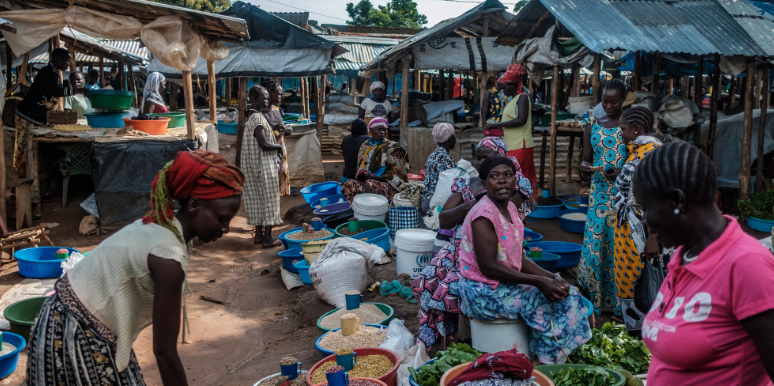Traders in Yei town in Yei River County of Central Equatoria have blamed insecurity, multiple taxations, illegal checkpoints, and the high rate of the U.S. dollar for increased commodity prices.
The traders say the above factors coupled with the high cost of imports have led to diminished profits and yet they cannot increase prices out of fear of losing customers.
Bida Charles, a trader who supplies rural markets, told Radio Tamazuj Thursday they only sell commodities from their store in Yei town because of over taxation from checkpoints along the roads.
“For now we are selling a bucket of maize flour at SSP 4,000 and for cassava is 3,000. I do not know what the government is doing and want them to help us,” he says. “When you go to the rural markets, each roadblock takes money and when we raise the price of the commodity, customers start complaining. What is affecting us majorly as traders are the roadblocks, fuel, and insecurity.”
Bashir Abdul, another trader who deals in fruits and fruit juice attributes the rising prices of commodities to the high dollar rate in the exchange market and said that people should not be forced to use foreign currency locally.
“The issue of the dollar should be looked at because when you go to the market, people tend to mention the dollar even those who have not seen a dollar talk about it,” he said. “So, the issue of the dollar should be looked at so that everyone can stay in happiness.”
Rose Awate, a consumer, said prices in the market have risen so high for necessities like oil, soap, and flour and appealed to the government to dialogue with traders to reduce their prices.
“Things in the market are very expensive. I used to buy oil at SSP 20,000 but it has now gone to 22, 000 for five liters. 25 kg of flour was at 10,000 but has gone to SSP 11,000 while 50 kg now goes for 24,000 from SSP 20,000,” she lamented. “We want the government to talk to the business community so that prices of goods and dollar rate are reduced because we are really tired.”
For his part, the chairperson of the chamber of commerce in Yei, Justin Luate, blamed the local government for imposing multiple taxations on traders and the emergence of illegal roadblocks along major trade roads.
“In South Sudan, we have factors that are internal and one of them is multiple taxations by the government. We have the national, state, county and the payam and all of them are collecting taxes. Coupled with that, we have roadblocks on all the roads leading to Yei,” he explained. “All these roadblocks are levying some illegal collections. We call them illegal because they are not mandated to collect any taxes but they do.”
“Of course, the trader will always calculate his expenses and then put a price based on that,” he adds.
Luate however urged the business community in Yei not to exaggerate things in the market by hiking prices.
“My message to the business community is that in difficult times like these, we need to restrain ourselves. We need to make sure we do not go out of control but remain within limits,” he advised. “If you calculate your costs, there is a small margin, and please concentrate on that small margin and earn something until things get better. We should not exaggerate things and hike prices.”
Meanwhile, Yei County Commissioner Aggrey Cyrus Kanyikwa said the concern about the roadblocks has been addressed to the state leadership and that they are working to have them removed.
“As the commissioner, we have also raised it to the state level to make sure that these roadblocks are lifted,” he said. “However, because of the security situation in Lainya, it has become complicated for the commissioner there to remove some of these roadblocks because of the fear of roadside attacks.”
“We are working on how we can improve these roadblocks and in the last meeting we held, we agreed to minimize these roadblocks in Yei,” he added.
Yei River County which lies in the green belt used to supply parts of South Sudan with agricultural produce but was affected by the outbreak of violence in 2013 and again. Many farmers left their homes for the safety of urban areas and refugee camps in neighboring Uganda and the Democratic Republic of Congo (DRC).



